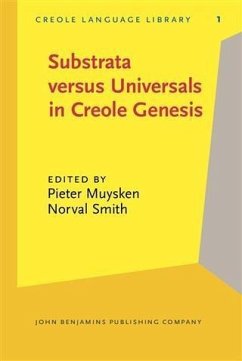Two of the most prominent hypotheses about why the structures of the Creole languages of the Atlantic and the Pacific differ are the universalist and he substrate hypotheses. The universalist hypothesis claims, essentially, that the particular grammatical properties of Creole languages directly reflect universal aspects of the human language capacity, and thus Creole genesis involves, then, the stripping away of the accretions of language history. The substrate hypothesis claims, on the other hand, that creole genesis results from the confrontation of two systems, the native languages of the colonized groups, and the dominant colonial language, and that the native language leaves strong traces in the resulting Creole. The contributions of this ground breaking collection present new and historical research on the old debate of substrata versus universals in Creole languages.
Dieser Download kann aus rechtlichen Gründen nur mit Rechnungsadresse in A, B, BG, CY, CZ, D, DK, EW, E, FIN, F, GR, HR, H, IRL, I, LT, L, LR, M, NL, PL, P, R, S, SLO, SK ausgeliefert werden.


